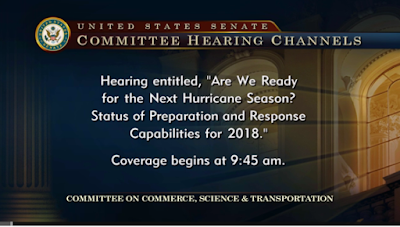#13,283
Even though hurricane season doesn't start for another 5 weeks, I'm already starting to ramp up my preparedness in case - as I did last year - I'm forced to evacuate due to an approaching storm.
Compared to the folks in Texas, Puerto Rico, and South Florida I was very lucky, as my home was left standing, even though the power was out for 5 days.As a native Floridian, and a long time resident of both Florida's west coast and (briefly) the Keys, this wasn't my first brush with a natural disaster, but it did highlight some gaps in my preparedness (see A Post Irma Update).
On a much grander scale - cities, states, and numerous federal agencies, along with NGO relief agencies - found themselves severely challenged by last year's hurricane season, and are already gearing up for the upcoming season.
Earlier this month the U.S. Senate Committee On Commerce, Science & Transportation, held a 2.5 hour hearing on our nation's readiness to deal with the 2018 hurricane season.The written testimonies and video are available below. I'll return with a postscript when you return.
April 12, 2018
Are We Ready for the Next Hurricane Season? Status of Preparation and Response Capabilities for 2018
U.S. Sen. Roger Wicker (R-Miss.) will convene a hearing at 9:45 a.m. on Thursday, April 12, 2018, entitled “Are We Ready for the Next Hurricane Season? Status of Preparation and Response Capabilities for 2018.” The hearing will examine the status of local and federal agencies’ recovery from the 2017 Atlantic hurricane season, and ongoing preparation for the 2018 season.
Panel 1 (testimony only):
Mr. Chuck Lindsey, City Manager, Marathon, Florida
Mr. Jamie Miller, Deputy Director for Governmental Affairs and Chief Innovation Officer, Mississippi Development Authority
Ms. Jennifer Pipa, Regional Chief Executive Officer, American Red Cross of Central Florida
Panel 2 (testimony followed by questions):
Rear Admiral Tim Gallaudet, Ph.D., USN Ret., Assistant Secretary of Commerce for Oceans and Atmosphere and Acting Under Secretary of Commerce for Oceans and Atmosphere, National Oceanic and Atmospheric Administration
Rear Admiral Linda Fagan, Deputy Commandant for Operations, Policy, and Capabilities, U.S. Coast Guard
T. Bella Dinh-Zarr, Ph.D., Member, National Transportation Safety Board
*Witness lists subject to change.
Hearing Details:
Thursday, April 12, 2018
9:45 a.m.
Full Committee
This hearing will take place in Russell Senate Office Building, Room 253. Witness testimony, opening statements, and a live video of the hearing will be available on www.commerce.senate.gov.
Governments and NGOs can only do so much, and they are often focused on the `bigger picture'; getting roads cleared, the power back on, hospitals running, and the delivery of emergency supplies to distribution points.
On an individual level, those caught up in a major disaster may find themselves needing to fend for themselves for 72 hours or longer.As I've written often (see #NatlPrep: Disaster Buddies) people who live alone - nearly 1 person in 10 in the United States - are particularly vulnerable during a disaster.
For some of them, having a place to go when staying put would endanger their safety, and a way to get there, can literally mean the difference between life and death.If a disaster struck your region today without warning, and the power went out, stores closed their doors, and water stopped flowing from your kitchen tap for the next 7 to 10 days . . . do you have:
- A battery operated NWS Emergency Radio to find out what was going on, and to get vital instructions from emergency officials?
- A decent first-aid kit, so that you can treat injuries?
- Enough non-perishable food and water on hand to feed and hydrate your family (including pets) for the duration?
- A way to provide light (and in cold climates, heat) for your family without electricity? And a way to cook? And to do this safely?
- A small supply of cash to use in case credit/debit machines are not working?
- An emergency plan, including meeting places, emergency out-of-state contact numbers, a disaster buddy, and in case you must evacuate, a bug-out bag?
- Spare supply of essential prescription medicines that you or your family may need?

